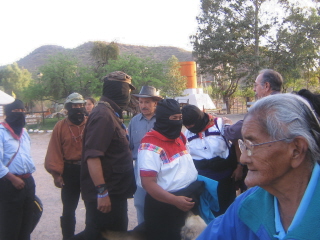Marcos and Comandantes arrive in Sonora
By Brenda Norrell (website)
April 10, 2007

MAGDALENA DE KINO, Sonora, Mexico – Subcomandante Marcos and 10 Comandantes from Chiapas were welcomed by O’odham and friends in the state of Sonora and departed Monday for the Cucapa Peace Camp to uphold Indigenous fishing rights.
Marcos discussed the Intercontinental Indigenous Conference, planned for northwest Mexico for the fall of 2007.
During an interview, Marcos said he hopes the Intercontinental gathering will “touch the hearts and recuperate the souls.”
“When Indigenous Peoples come together from all regions, they will realize that money means nothing when compared to the values of Indigenous Peoples.”
The Zapatista delegation was enroute to the Cucapa (Cocapah) Peace Camp in Baja California, in the Cucapa community of El Mayor, 40 miles south of Mexicali near the Arizona/California border. The camp has been underway since fishing season began in March and continues through May.
The delegation of Mayan Comandantes from Chiapas included four women and six men. Comandantas Kelly, Susana, Yolanda and Dalia and Comandantes Tacho, David, Eduardo, Guillermo, Emiliano and Masho.
Speaking in Spanish and English, Marcos said the Cucapa people have lived in their territory for 9,000 years and were fishing long before Spain, the United States or Mexico existed.
“They take care of the land, the air, the water, trees, the natural world.”
“We are the Guardians.”
Marcos said the government of Mexico has falsely accused the Cucapa of destroying the natural world. At the same time, the Mexican military pretends to be fighting the drug traffickers.
“The Mexican Army is not fighting against drug dealers. They are fighting against Indian people.”
“The Cucapa are doing the same thing they have been doing for 9,000 years. The Cucapa and other Indian people called for this camp in defense of nature. So they can fish without detentions or being put in jail,” Marcos said.
Marcos visited the Indian tribes in northwest Mexico during the Zapatistas’ Other Campaign in the fall of 2006. The neighboring Quilihua women had taken a vow to stop having children and become extinct rather than try to survive without their ability to fish.
“We said we will come and stay with you, without guns, only with our words,” Marcos said during the interview Sunday.
Marcos said the world has not responded to the desperation of Indigenous Peoples.
“The United Nations does not have ears to hear that pain.”
“It is a shame.”
Marcos urged American Indians in the United States to unite with Zapatistas in the struggle for Indigenous rights.
Marcos said before the days of politicians and enterprises, Indian people were here. “We, the Indian people, lived here on this land. The money people came and brought drugs, prostitution and all of the diseases of the money people,” Marcos said in English.
Marcos pointed out that the Tohono O’odham people live on both sides of the international border, in Sonora, Mexico and in Arizona in the United States.
“But it is the same people. If the O’odham in Mexico and the O’odham in the United States come together, they can realize a force more powerful than money.”
Marcos said that even when Indian people have money, there are those that say, “An Indian is an Indian.”
“No matter how much they say they love us, it is not true. They can not love us because of the color of our skin.”
Marcos called on Indigenous Peoples to claim their destiny as Guardians of the Earth.
“Everything that is life will be killed. We must join the fight to save the earth. The gods gave us that mission. We must take care of the earth together, but with respect for our differences, Yaqui, Mayo, Tzetzal. Each people have their own identity, depending on their culture.”
“The people with money said we are a barbarious people, but our people are people of peace. We fight only if they attack us. The government thinks we are failures, but they have to know that we are Guardians of this land.”
In the state of Sonora, south of the Arizona border, the Zapatistas were greeted by O’odham in Mexico Lt. Gov. Jose Garcia, wife Maria and mother Elena Garcia. The delegation stayed at the ecotourism center south of Magdalena, Rancho el Penasco, Casa de Ecoturismo, where the Other Campaign stayed in October during the listening session with O’odham.
During their overnight stay, Zapatistas rested and enjoyed meals of chicken mole, Sonoran tepary beans and dried beef.
The Zapatista delegation was followed by Mexican undercover police. Initially one vehicle from the state of Sinoloa was parked at the entrance to the center, but the number grew to six vehicles, including one local police vehicle, with four undercover vehicles following the delegation as they departed for Cucapa in the state of Baja California. In Chiapas, paramilitary attacks against the Zapatistas have increased, as corporations seek to seize the land and natural resources.
Marcos said he will return to Magdalena in less than two weeks and invited the public to a gathering at Rancho el Penasco, 11 kilometers south of Magdalena on the highway to Hermosillo, on Sunday, April 22, 2007. Marcos said there will be an announcement about the Intercontinental gathering to be held in the fall of 2007 in northwestern Mexico. Magdalena in a one and one-half hour drive south of Nogales, Arizona.
News reporter Brenda Norrell
brendanorrell@gmail.com
http://www.bsnorrell.blogspot.com

Indigenous Peoples are putting their bodies on the line and it's our responsibility to make sure you know why. That takes time, expertise and resources - and we're up against a constant tide of misinformation and distorted coverage. By supporting IC you're empowering the kind of journalism we need, at the moment we need it most.